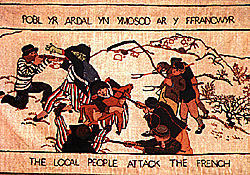 After the outbreak of war between Britain and France in 1793, French General Hoche planned an invasion to liberate Ireland. The attempt was thwarted by fierce storms which forced the invasion fleet to return to Brest. A smaller force, under the command of an American from South Carolina, was forced by the storms to detour from Ireland to England. Nearly 1,200 "soldiers" in a so-called "Black Legion" (a mixture of enthusiastic republicans of the Revolution, deserters and royalist prisoners) landed successfully in Wales. Although this invasion force was quickly contained and destroyed, the event caused a panic and had numerous repercussions, including the first issue of low denomination paper money in England.
After the outbreak of war between Britain and France in 1793, French General Hoche planned an invasion to liberate Ireland. The attempt was thwarted by fierce storms which forced the invasion fleet to return to Brest. A smaller force, under the command of an American from South Carolina, was forced by the storms to detour from Ireland to England. Nearly 1,200 "soldiers" in a so-called "Black Legion" (a mixture of enthusiastic republicans of the Revolution, deserters and royalist prisoners) landed successfully in Wales. Although this invasion force was quickly contained and destroyed, the event caused a panic and had numerous repercussions, including the first issue of low denomination paper money in England.
I suppose we all know quite a lot about Austerlitz, Borodino and Waterloo; but I wonder, how much do you know about Fishguard, 22-24 February 1797 -- the last invasion by sea against Great Britain? I must confess not to have known much about it previously, but, after all, the great Sir John Fortescue's ten volumes on History of the British Army (1899) had only ten lines written on the subject.
The February weather was cold, and French morale was already low -- but for two days the enemy looted from a dozen small Welsh hamlets. Meanwhile Lord Cawdor and Lt. Colonel John Colby finally collected the Pembroke Yeomanry, the Pembrokeshire Militia and a force of Royal Navy sailors, who served together with a few cannon.
After a little skirmishing against their starving French foes, some of the local people came to arms. According to the local tradition, the French feared on the 23rd that the British had received reinforcements -- but these were in fact only several hundred Welsh women wearing their red shawls and black hats to watch from a hillside. Whether this story is myth or not, by herself, local heroine Jemima Nicholas is credited with rounding up twelve French soldiers armed only with a pitchfork.
Throughout 1997, the town of Fishguard held a series of celebrations to mark the bicentennial of the battle. On 30 August, almost 230 members of the British "Napoleonic Association" re-enacted the French surrender. The greatest moment came when Lt. Colonel Tom Tate (USA Army) -- the direct descendant of the original invasion commander William Tate -- was honored that day. To commemorate the ocassion, his sword was given to Fishguard Township for its town hall as a symbol of modern Anglo-American friendship. Not to be out-done, the Mayor presented a new replica sword to Major Tate.
Some 70 French re-enactors had come to Wales from Ireland by ferry; and as a reward, the Frenchmen were permitted to "storm" the old fort and Lower Fishguard on the evening of 30 August -- non-historical, but a tactful victory. Nevertheless, the town was restored to the British on the 31st.
There were only two known casualties of the 1997 event -- one a soldier of the British 9th Regiment who over-loaded his musket and was badly bruised on his shoulder for his pains, while le general Hoche (who wasn't supposed to be present at all!) had his right large toe sadly crushed by his fine boots. These casualties -- one English and one so-called Frenchman -- are believed to have completely recovered before drinking time.
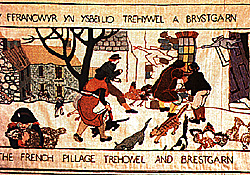 At right, two panels from a acommemorative tapestry. © Elizabeth Cramp.
At right, two panels from a acommemorative tapestry. © Elizabeth Cramp.
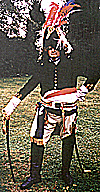 The general de division Louis Lazare Hoche (1768-97) [at right, looking remarkably like David Chandler] never actually set foot in England on the twenty-second of February. His main naval and military forces had intended to land on Ireland near Bantry Bay on 21-27 December 1796, but gales forced him to abandon his Revolutionary invasion, and he escaped back to Brest.
The general de division Louis Lazare Hoche (1768-97) [at right, looking remarkably like David Chandler] never actually set foot in England on the twenty-second of February. His main naval and military forces had intended to land on Ireland near Bantry Bay on 21-27 December 1796, but gales forced him to abandon his Revolutionary invasion, and he escaped back to Brest.
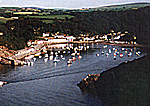 However, his subordinate, general de brigade William Tate (an American officer aged 44) subsequently made a secondary raid with four ships against Fishguard [bay at left] with about 1,230 French troops (mostly, it must be admitted, from the Parisian jails) -- a motley group of two battalions.
However, his subordinate, general de brigade William Tate (an American officer aged 44) subsequently made a secondary raid with four ships against Fishguard [bay at left] with about 1,230 French troops (mostly, it must be admitted, from the Parisian jails) -- a motley group of two battalions.
 A real battle never developed, for the demoralized French officers opened negotiations at "The Royal Oak" public house in Fishguard, and were eventually forced to lay down their arms for unconditional surrender. William Tate was taken prisoner, his sword handed to Lord Cawdor near Trehowel Farm. Perhaps a dozen men had been killed or wounded. The rest of the French troops capitulated near Goodwick Sands and were marched inland by the Militia. Thus ended the last invasion of Great Britain -- and the result was a fiasco for the French. The event will now be remembered forever since a fine tapestry has been made by the local ladies this year.
A real battle never developed, for the demoralized French officers opened negotiations at "The Royal Oak" public house in Fishguard, and were eventually forced to lay down their arms for unconditional surrender. William Tate was taken prisoner, his sword handed to Lord Cawdor near Trehowel Farm. Perhaps a dozen men had been killed or wounded. The rest of the French troops capitulated near Goodwick Sands and were marched inland by the Militia. Thus ended the last invasion of Great Britain -- and the result was a fiasco for the French. The event will now be remembered forever since a fine tapestry has been made by the local ladies this year.
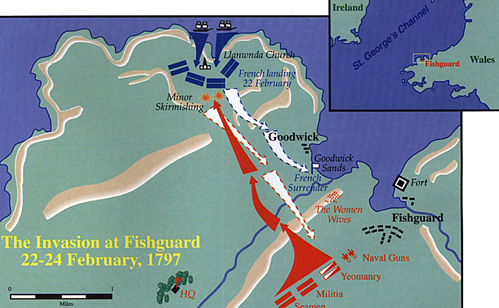
Back to Table of Contents -- Napoleon #11
Back to Napoleon List of Issues
Back to MagWeb Master Magazine List
© Copyright 1997 by Emperor's Press.
This article appears in MagWeb (Magazine Web) on the Internet World Wide Web.
The full text and graphics from other military history magazines and gaming magazines are available at http://www.magweb.com